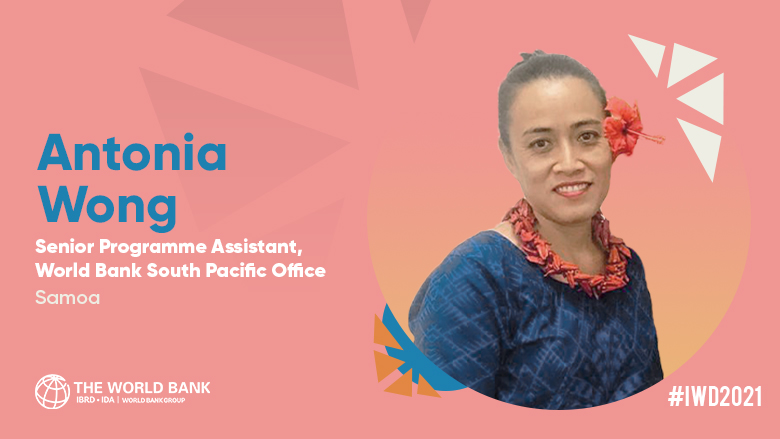What led you to work with the World Bank?
Early in my career, I worked in the Ministry of Finance in Samoa. But I was always intrigued by the work of the World Bank.
There were two World Bank projects that caught my attention. The first was the Samoa Infrastructure Asset Management Project that expanded a two lane road into a four lane road - the first project of its kind in Samoa. The second was the Pacific Regional Connectivity Project that reduced the cost of telecommunications and IT services and increased the availability of Internet service throughout the country. Both of these projects made a huge impact on the community.
Another factor that drew me to the World Bank was how it engages with the local community, from the beginning of a project to its conclusion. The World Bank consults with local people on issues like land rights, explains the benefits of projects, seeks to find solutions and even joins us in our traditional way of celebration when a major project milestone is achieved. The teamwork, comradery and diversity really stood out to me.
How was your work impacted by the pandemic?
The World Bank Suva office had to transition to remote work last March after Fiji had its first COVID-19 case. Working from home was a big adjustment. I had to juggle work on top of caring for family and household chores. The number of meetings also skyrocketed, because we still had to oversee projects across different countries and time zones. I can say that I’ve never worn a headset and earphones for that long in my entire life. They were like accessories stuck to my head!
Even though the workload increased, we as a team figured things out together. We communicated a lot and made sure to continue to check in on one another, pulling together both professionally and personally. Because that’s what good teams do. Despite the challenges, we managed to achieve a lot, including processing COVID-19 emergency projects. I can now proudly say that I can be productive without being in the office.
Has the pandemic presented any new challenges or opportunities for women in Samoa?
A number of women have lost their sources of income because of the pandemic. Lockdowns also mean that many women have been forced to stay at home with violent or abusive partners. Women who are primary caregivers had to become full-time teachers overnight, from home-schooling their children and caring for their young ones, on top of managing the entire household. COVID-19 created so many impacts that were linked to gender roles.
In saying that, I think that it has also provided new opportunities for women to come together, find their voices and reach out in ways they might not have done before.
But, as a whole, I would say the pandemic has maintained old challenges and created new ones. We need to do better together for our women, in Samoa and the Pacific as a whole.
Is there a female leader that inspires you?
My mother. She is a shining light and an embodiment of love, dedication, loyalty, and modesty. My siblings and I are where we are in life because of her. She showered us with unconditional love and dedication and ensured that we had a happy, safe and solid future.
In the beginning, she was a stay-at-home mum. But when my youngest brother started school, she bought herself a cab and became a taxi driver. I think she was the first female taxi driver in Samoa! It turned out pretty well, because she was so popular. Other women would reach out to her to ask if she can pick up and drop off their children to school.
One of the best things about my mother is her ability to remain optimistic during uncertain times. It was especially helpful for my family during the pandemic.
Do you have any advice for Pacific women?
Some of the best advice I received was from my late husband. One day I couldn’t decide what shoes I wanted to wear to the office, but I knew I wanted something comfortable. My husband said to me, "Wear your sport shoes." I hesitated, because sport shoes are not really formal. But he said to me, "You start a trend. Then you'll see how many others will follow suit."
So, my advice to Pacific women is don’t be afraid to start your own trend. But make sure you do it with class!
What kind of world would you like the next generation to inherit?
A world where chickens are free to cross the road without being judged for where they are going or fear of being eaten! No, but seriously, I want a future where all children grow up with access to free and quality medical services and access to free education. I want them to be safe and happy. And I hope this pandemic goes away completely.
We should show more kindness towards each other instead of focusing on each other's differences. We should recognize each other by celebrating each other's uniqueness, regardless of the color of our skin, gender, sexuality, age, nationality or religion. That’s the world I would like to see.
Follow World Bank Pacific on Facebook to make sure you don’t miss any of our Pacific Women in Leadership series.
**The views expressed in this interview do not necessarily represent the views of the World Bank Group.

